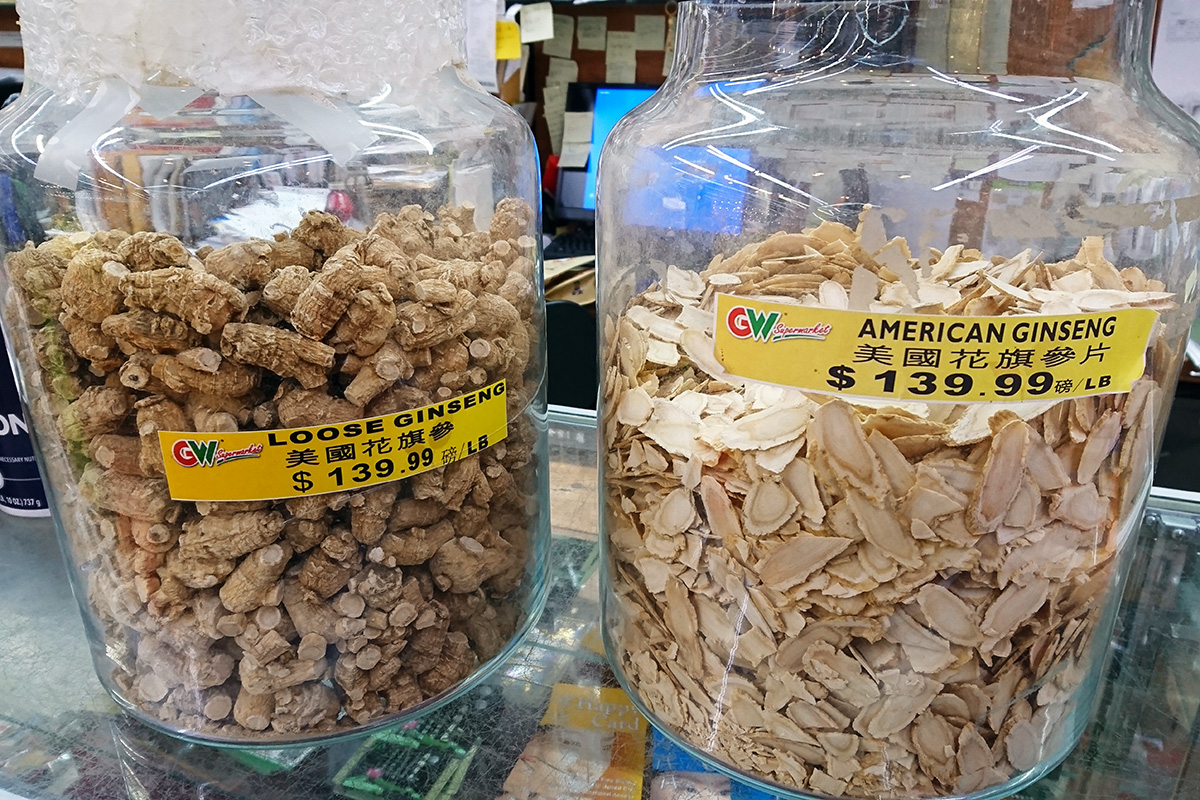In Traditional Chinese Medicine, Ginseng Is King of Tonic Herbs

Dried ginseng roots are sold in different shapes in the Asian grocery store. Photo by Shirly Hsuan Chang
“You had me at ginseng.”
This reference to the famous line from Jerry Maguire was the very first thing the U.S. consular officer told me during my visa interview one year ago in Taiwan. My application indicated that I would be joining a Smithsonian project to research American ginseng, so he tested me with a question: “What does ginseng do?”
I replied that ginseng is an herb that can give you more energy. With a little excitement, the officer continued with his own experience of taking ginseng extract once when very sick, that the bitter yet weirdly sweet liquid had indeed restored his vigor. It was my first serendipitous step on this ginseng journey.
Asians, especially Chinese, have used ginseng—both the Asian and American species—for centuries and praise its virtues: that it makes aging people young, lets dying people live, wards off fatigue, and can add decades to one’s life. Chinese people often share legends and folktales about ginseng transforming into various kind figures, helping people overcome all sorts of sickness and difficulties. Such stories demonstrate a reverence not only for ginseng, but also for any type of medical panacea. Even Carl Linnaeus, the famous sixteenth-century Swedish botanist, knew of ginseng’s value and established for it a new genus: Panax,from the ancient Greek πᾶν (pân or “all”) + ἄκος (ákos or “cure”), meaning “all-curing” or “panacea.”
On the other hand, traditional Chinese medicine (TCM) regards ginseng not as a panacea, but rather as a powerful tonic—sometimes known as “the king of tonic herbs,” based on TCM’s guiding principles of maintenance and prevention. TCM doctors often prescribe ginseng—albeit under conditions that are very specific and restricted.

The root is the part of a ginseng plant typically used as medicine. TCM claims that the root increases qi (氣), or energy. More precisely, ginseng arranges the qi streaming in the body and “converges” it to the parts of the body that need strengthening and revitalization. Accordingly, some experts insist that ginseng can be applied only when “evil qi” (邪氣) is absent. According to TCM, evil qi causes disease: if it infiltrates your heart, you will have heart disease; if it penetrates your lungs, your lungs will weaken.
Because ginseng has only tonic properties, administering it without first driving out evil qi would merely enrich bad influences and augment their presence in the body. Hence, TCM practitioners always prescribe ginseng with other herbs that have an expelling effect. When those herbs eliminate the evil qi, ginseng takes over to help restore the proper influences, namely the qi that energizes and helps us recover from physical weakness.
TCM doctors often prescribe ginseng for digestive functions associated with the spleen—which in TCM refers not to a specific organ but rather a system that regulates digestion (the spleen meridian, 脾經). In TCM, the spleen is probably the most important system: a central control center that regulates qi and blood throughout the body. In other words, to nourish your spleen is to invigorate your body. This explains why ginseng is often prescribed to treat digestive disorders.
Another classic spleen tonic is known as sijunzi tang (四君子湯, the four gentlemen formula). Its four ingredients are ginseng, bai zhu (白朮, Atractylodis), fu ling (茯苓, Poriae), and gan cao (甘草, honey fried licorice). All four herbs must work together in harmony in order achieve the optimal results; if any one of the four herbs is missing, the formula will not work. In this case, ginseng is the key ingredient. Only in rare instances is ginseng prescribed on its own, such as dushen tang (獨參湯), a formula for patients on the verge of death and therefore used only by professionals.


TCM practitioners consider both the properties of medicinal herbs and the characteristics of individuals, adjusting their treatments accordingly. That means they may treat two patients with the same disease in different ways. Some doctors deem ginseng excessively strong for certain cases.
“Ginseng, in my opinion—don’t use it if you don’t really have to, especially for young people,” maintains Dr. Shi-hua Wu, a longtime TCM practitioner in Washington, D.C.’s Chinatown. He prescribes ginseng only for life-threatening illnesses and keeps a supply of ginseng in his dispensary for those emergency cases. Wu believes ginseng might harm healthy young people whose bodies already contain a sufficient amount of qi.
Similarly, Elizabeth Girard, a TCM practitioner in Northampton, Massachusetts, reserves ginseng for only the most serious chronic cases.
“There are cases that there really is not a substitute,” she told us. “You can try to substitute, but it just doesn’t work as well.”
Although many Westerners associate ginseng with traditional Chinese culture, the average person in China rarely encounters the herb. Chinese officials strictly regulate the harvest and trade of ginseng, which is extremely expensive because of its scarcity in the wild. Its elusiveness, along with the belief in its healing properties, make it seem sacred, even divine—something reserved only for Chinese royalty.
As a result, the belief in ginseng as a sacred herb that may bring wealth, health, longevity, happiness, and success is ultimately more spiritual than medical in Chinese culture. But even if not so magical, ginseng has certain benefits for those who practice traditional Chinese medicine. When you need to boost your energy or prepare yourself for ailments or stress, you may want to try it—just like the consular officer who interviewed me in Taiwan. You see, I had him at ginseng.
Shirly Hsuan Chang is a research intern at the Center for Folklife and Cultural Heritage with the American ginseng project. She brings a botanist’s perspective to the project.

